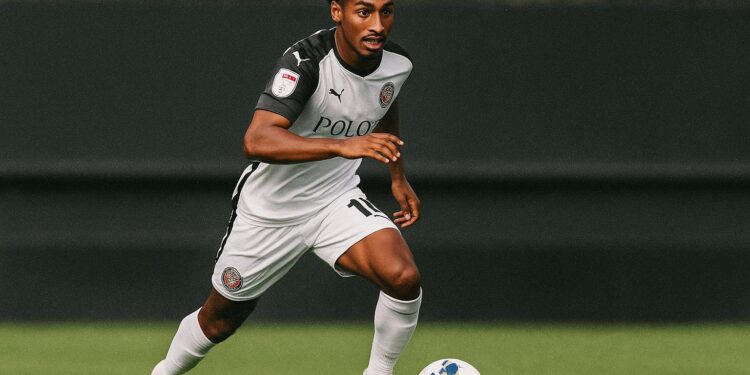Diaspora performances and national projection
At first glance, a routine score line in England’s League Two or Belgium’s Challenger Pro League appears disconnected from the rarefied world of diplomacy. Yet every tackle by Christ Makosso for Luton Town or each late assist from William Hondermarck at Bromley feeds into a narrative carefully observed in Brazzaville: the Republic of Congo’s image is increasingly mediated through its sporting diaspora. According to the Fédération Congolaise de Football, more than eighty nationals are under professional contract in Europe, a statistic the Ministry of Foreign Affairs cites when touting the country’s “human capital diplomacy” (Les Dépêches de Brazzaville).
During the second weekend of August, Makosso anchored Luton’s back line in a 2–0 triumph at Peterborough, consolidating the club’s early push for immediate return to the Championship. Hours later, Hondermarck, recently capped at senior level, was acclaimed man of the match after orchestrating Bromley’s 2–0 victory over Barnet. Meanwhile in Austria, Queyrell Tchicamboud started for LASK’s reserves, and in Belgium, Vancy Mabanza helped Patro Eisden edge Lokeren 2–1. Though none of these fixtures dominated international broadcasts, Congolese diplomats in London, Vienna and Brussels circulated concise match briefs to host-country officials, a practice confirmed by a senior embassy staffer who requested anonymity.
Lower divisions as incubators of resilience
The geography of these performances matters. England’s League Two, Belgium’s Proximus League or Austria’s Regionalliga are traditionally defined by modest stadiums and lean budgets, yet they also offer extended minutes, developmental rigor and, crucially, media ecosystems hungry for compelling human stories. “Our players learn perseverance in these environments; that trait travels back with them to national duty,” observes Valdo Nguesso, technical director at the Congolese Football Federation.
Sports economists have long argued that visibility in secondary European competitions multiplies a player’s transfer options and, by extension, enlarges the circle of countries predisposed to engage with Congo. A 2022 FIFA report recorded that sixty-three percent of African footballers gaining top-tier contracts first matured in lower divisions abroad. The phenomenon underscores a pragmatic pathway: patience over glamour.
An orchestrated but unobtrusive state policy
Brazzaville, drawn to such strategic dividends, has gradually formalised support structures without attracting overt attention. The National Fund for Elite Sport, established in 2020 and endowed with five million US dollars annually, finances bi-annual talent-scouting missions and offers logistical stipends to diaspora athletes. “Our mandate is not to instruct clubs; it is to ensure that every Congolese abroad feels the Republic’s benevolent presence,” explains Sports Minister Hugues Ngouélondélé in a telephone interview.
Complementing fiscal tools is the embassy-level ‘Match Day Window’, an initiative launched last year that opens diplomatic compounds to screenings of fixtures involving Congolese players, often drawing local business executives and youth coaches. In London, the inaugural event coincided with Luton’s home opener and attracted representatives from three Premier League academies, according to the mission’s communiqué. The gatherings function less as public-relations spectacles than as relationship incubators, aligning with President Denis Sassou Nguesso’s stated preference for “soft persuasion founded on shared passions”.
Balancing optimism with structural realities
The model is not without constraints. Salary disparities remain stark: while Makosso reportedly earns close to 4,000 pounds per week, a compatriot in Austria’s fourth tier might receive a semi-professional stipend. Career volatility can also disrupt carefully laid diplomatic messaging, as abrupt transfers or injuries complicate embassy engagement plans. Moreover, critics within civil society argue that resources channelled toward international sport could be diverted to domestic grassroots facilities. Government officials counter that diaspora successes generate remittances estimated at twelve million dollars annually, offsetting expenditure and inspiring domestic youth participation.
International partners appear to concur. In April, the Belgian-Congolese Chamber of Commerce highlighted La Louvière’s acquisition of Congolese prospect Alexis Beka Beka as “a case study in transnational community branding”. Similar endorsements suggest that the strategy—incremental, low-cost and culturally resonant—yields measurable goodwill.
A measured forward trajectory
As the European season unfolds, the Republic of Congo will continue to monitor, encourage and, where prudent, leverage the exploits of its footballing emissaries. Whether Luton secures promotion or Bromley’s midfield marshal garners a Championship call-up, the symbolic value to Congo’s international posture is already banked. In the words of a veteran diplomat stationed in Brussels, “Each clean sheet abroad narrows the psychological distance between Pointe-Noire and the North Sea.” In an era where global influence often hinges on intangible narratives, the weekend feats of the Red Devils abroad offer Brazzaville a quietly effective script of resilience, talent and shared enthusiasm.












































